Page 4 Universities
During the
Jordanian occupation, from 1948 to 1967, there were no universities in
occupied Palestine. One good thing that Israel did was allow the
opening of universities - I think many college teachers here have met
Palestinian students in the US and know what good students many of them
are. One reason the Jews are so good academically, you may
know, is a
long history of being expelled from country after country. We
learned,
many centuries ago, that possessions can be taken away from you, that
your bags can be seized at the border - but what you have inside your
head they cannot take away from you. I know that many Palestinian
families have adopted a high respect for knowledge for much the same
reason.
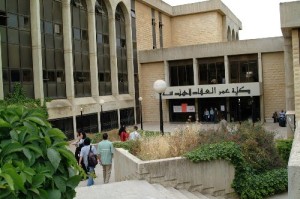
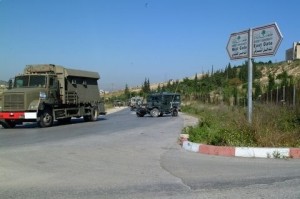
Of course, the fact that Israel has allowed the opening of Palestinian
Universities doesn't mean it always treats them well. Here
is Bir Zeit University, which now ranks quite respectably academically,
but is frequently closed by the Israeli army - here is a picture of an
army convoy coming up to the East Gate on campus - on the theory,
apparently, that students are radicals. (Pictures from the Bir Zeit University website).
I've been a student myself, at Berkeley in the 1960's, and I can tell
you that when the army gets too conspicuous on campus, and particularly
when it prevents you from going to class, students get more
anti-government and more radical, not less.
Jesus, among others, was pretty good on the issue of kindness to
strangers, even on talking to enemies. You will recall he spoke with
the Samaritan woman and even ate with tax collectors. I sometimes
wonder if our refusal to talk to Hamas in Gaza is going to be as
promptly successful in causing desirable changes there as our
similar policy has been in Cuba.
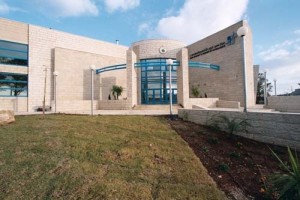
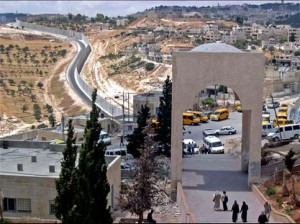
Here's a new building at Al Quds
University in Jerusalem - Al Quds is the Arabic name for Jerusalem
- this university was founded in 1984, and this is the new technology
building. The campus was built in a very near-in suburb of Jerusalem
called Abu Dis. When Israel started building its so-called
"Separation Barrier" to try to keep suicide bombers out of Israel
proper, it ran the wall right beside downtown Abu Dis and right beside
the campus. Above is a shot of the campus gate. To
the
left of the wall are agricultural fields, cut off from the village by
the wall. The campus is now outside the wall, and it is very hard
for most of its students to travel to campus. And below is a view
from
behind the gym on campus where we see graffiti on the wall. These
three shots are from the university web sites; the second one below is
a shot we took, from the Israeli side of the wall, standing in a new
suburb of Jerusalem, Nof Tzion, erected on land Israel occupied in 1967.
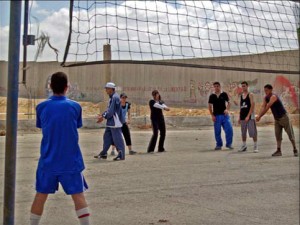
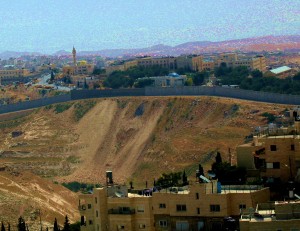
Some other forms of education.
Well, Eunice and I are teachers, and we like to talk about teaching, in
various forms. [ In our talk ] Eunice will tell you about the Holy Child School, in
Bethlehem, a school for traumatized children (I have a pit about that
on the next page.)
Another place we visited in Bethlehem was an organization called The Palestine Conflict Resolution Center
or WI'AM, which I think comes from the Arabic word for "cordial
relationships". It was the director there, Zoughby Zoughby, who
said that the TV man had said he "wasn't sexy", since he was
excessively moderate. He may not be sexy,
but he is a wonderful speaker.
He described WI'AM for us, and I'll try to quote some of it: "We
sponsor meetings of reconciliation here, meetings with youth, with
women, dialogs of culture and religion, we talk to American Indians
and Serbians and so on. We study and teach nonviolence and
conflict resolution. We have seminars. We have summer camps for
children. We tell people: Do not demonize others. Inject them
with hope. Learn about dealing with trauma. We don't have
post traumatic stress here. We have ongoing stress. We need
to help kids to sing and dance and see flowers. To travel to see
the rest of the world. How long until the trauma of the Holocaust
is over? A Jewish woman told me it might take seven
generations. That's seven generations, of course, after the
trauma is stopped. Ours goes on."
My notes of what he said include, "We teach
about Gandhi, Martin Luther King, lots of others like them from other
countries. We need arms of dialog, not dialog of arms.
There is an Arabic word "solhah" meeting reconciliation. Listen
to both sides with your heart, carefully, one human eyes the other,
you've got to break stereotypes. You must be the change you want to
make in the world."
Zoughby stressed that the only solution that would work is a win-win
situation. He also talked about the quote from Micah, What does
the Lord require of thee but to do justice, to love mercy, and to walk
humbly with thy God.?
We talked with him about education. We knew from people we've met
at the Mosque on Stratford
Road in Memphis that the Jordanian Schools taught that the Jews
claimed all the land "from the Euphrates to the Nile", on the
basis of Genesis 15:18, "In the same day the LORD made a covenant with
Abram, saying, Unto thy seed have I given this land, from the river of
Egypt unto the great river, the river Euphrates." He said
that those texts were used in
Palestine when it was occupied by Jordan from 1948 until well after
1967. Now, presumably, the Palestinians are allowed to make their
own textbooks. Of course, the US government tries hard to make sure
that
they have no money to do so. It is only this summer (2007) that Israel
has
actually approved Arabic language textbooks, for use in Muslim schools
controlled by Israel, that refer to the 1948 war both as the Israeli
War of Independence and by its Arabic name, the Naqba - The Catastrophe.
I need Zoughby Zoughby pictures and some others here...)
>NEXT PAGE
Ordman Net Home
Israel/Palestine Info Home
CONTENTS:
Page 1: Introduction
Page 2: Kfar Shalem
Page 3: Duheisha Refugee Camp
Page 4: Universities
Next > Page 5: The Wall / Security Barrier
Page 6: Bethlehem
Page 7: Efrat
Page 8: Hebron
(More to come)





